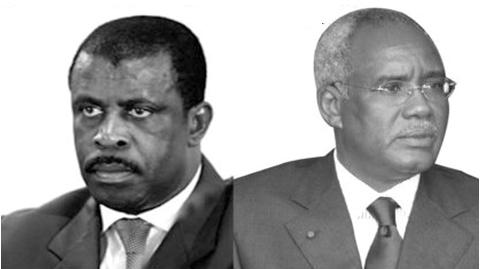In a Febraury 2007 cable from the US embassy in Yaounde which profiled “possible successors to President Biya” the then Prime Minister of the Republic, Ephraim Inoni, and the then Minister of State for Territorial Administration, Hamidou Marafa, were classfied under the category of “clean, competent and well-positioned” individuals with a shot at succeeding President Biya. Today, both men are behind bars, accused of embezzlement of state funds in the Albatross saga.
With the benefit of hindsight, let’s read what US ambassador Niels Marquardt thought of both men.
Prime Minister Ephraim INONI
A relatively successful Prime Minister who expresses no personal political ambition other than to serve his president well, Ephraim INONI’s competence has made him in the eyes of many an obvious possible successor to President Biya, although public opinion generally does not give any Anglophone much chance at this time. A native of the South West Province, INONI was born August 16, 1947.
Prior to joining the government he was a primary school teacher. INONI is a Treasury Inspector trained at the National School of Administration and Magistracy (ENAM) in 1977; he also holds a master’s degree from Southeastern University in Washington, DC (1982-1984). A member of the CPDM, INONI is married with four children; an Anglophone, he is also fluent in French; indeed, he governs almost exclusively in French.
Prior to his appointment as PM on December 8, 2004, INONI served for 12 years as Deputy Secretary General of the Presidency, where a key responsibility was the national program of bilingualism. He also was the GRC point person on Bakassi and some speculate that his appointment as PM was a reward for the ICJ ruling in Cameroon’s favor.
From 1982-1992 INONI held a series of finance, budget, salary and treasury positions throughout Cameroon and in the Embassy in Washington. He has served on several boards and gave up his position of Chairman of the Board of Administrators of Standard Chartered Bank, Cameroon when he became Prime Minister.
When he came to the Prime Minister’s office, some wondered if INONI would be strong enough to exert a firm grip over the Cabinet, especially in the face of strong, independent and politically well-connected ministers like his powerful former boss (until September 22, 2006, when he was appointed Foreign Minister) Presidential Secretary General ATANGANA MEBARA. (Other former bosses who now work – at least nominally – for INONI include Interior Minister MARAFA, PTT Minister BELLO Bouba, and Vice Prime Minister Amadou ALI.)
In his two years on the job, INONI has established himself as a reasonaly strong and effective leader with generally good control over most of Biya’s Ministers; however, his power is derived entirely from Biya’s and he has no political base of his own. He has achieved impressive results in helping Cameroon reach the HIPC completion point, in combating corruption and revamping the civil service.
MARAFA HAMIDOU YAYA Minister of Territorial Administration and Decentralization
A dynamic, personable and energetic man, MARAFA HAMIDOU YAYA has an excellent relationship with the U.S. Embassy – as well as the French, Japanese, British, and others. Like PM INONI, MARAFA’s intelligence and effectiveness have raised his national profile and make him a possible presidential candidate – perhaps even the front-runner.
He is the sole Cameroonian to have admitted, albeit privately, to the Ambassador that he harbors that ambition. He is also the likely preference of every Western Ambassador in town, including this one. MARAFA’s current responsibilities include organizing the 2007 legislative elections and pushing for improved security in Cameroon. His personality, competence, and bilingualism also make him a point person of choice to carry important messages abroad for Biya.
MARAFA was born in 1952 in the North Province. A U.S.-trained petroleum engineer (University of Kansas, 1980), MARAFA also holds a BA in Geology from the University of Yaounde (1976). A (not very devout) Muslim, MARAFA is a senior member of the CPDM, fluent in both English and French and married to a woman from Douala, with (adopted) children. His marriage — to a non-Muslim not from his region — is unpopular at home in Garoua, which means he has a better national base of power than he does in his home town — something unusual for a Cameroonian politician.
Before entering government, MARAFA worked for the National Hydrocarbons Company (SNH) where he served as head of the Exploration and Production Department (1981-1990) and as Technical Adviser in charge of relations with the IMF and World Bank (1990-1992). In November 1992, MARAFA joined the Ministry of Finance.
He was appointed Special Adviser to the President in 1995, Secretary General at the Presidency in 1997, Minister of State and Secretary General in 2001. Biya jailed MARAFA for several years after the 1984 coup attempt, although there was no evidence against him, but the two have obviously reconciled and Biya relies on MARAFA for advice on many key issues. MARAFA became Minister of Territorial Administration and Decentralization (MINATD) in October 2002 when legislative and municipal elections were postponed due to poor organization. President Biya needed someone he could trust and MARAFA has proved his reliability within a sensitive ministry.
MARAFA has worked hard to instil a sense of national (vice provincial) loyalty among MINATD employees and is the first Minister of Territorial Administration to conduct a national tour to educate Cameroonians about the importance of elections and encouraging voter registration. He is widely seen as having improved election organization and since February 2006 has begun work on decentralization which is needed badly in Cameroon.
See online: Albatross Affair: A Profile of Ephraim Inoni and Hamidou Marafa

